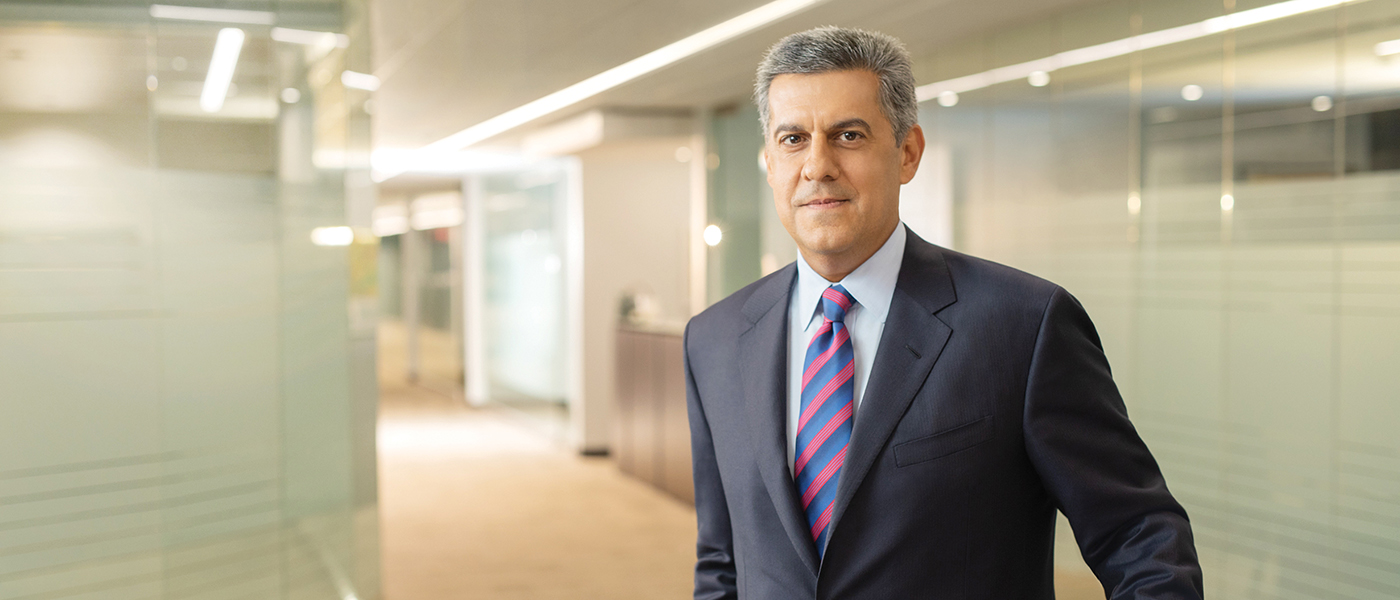When a hurricane strikes, HCA Healthcare is prepared with a powerful response in the communities we serve.
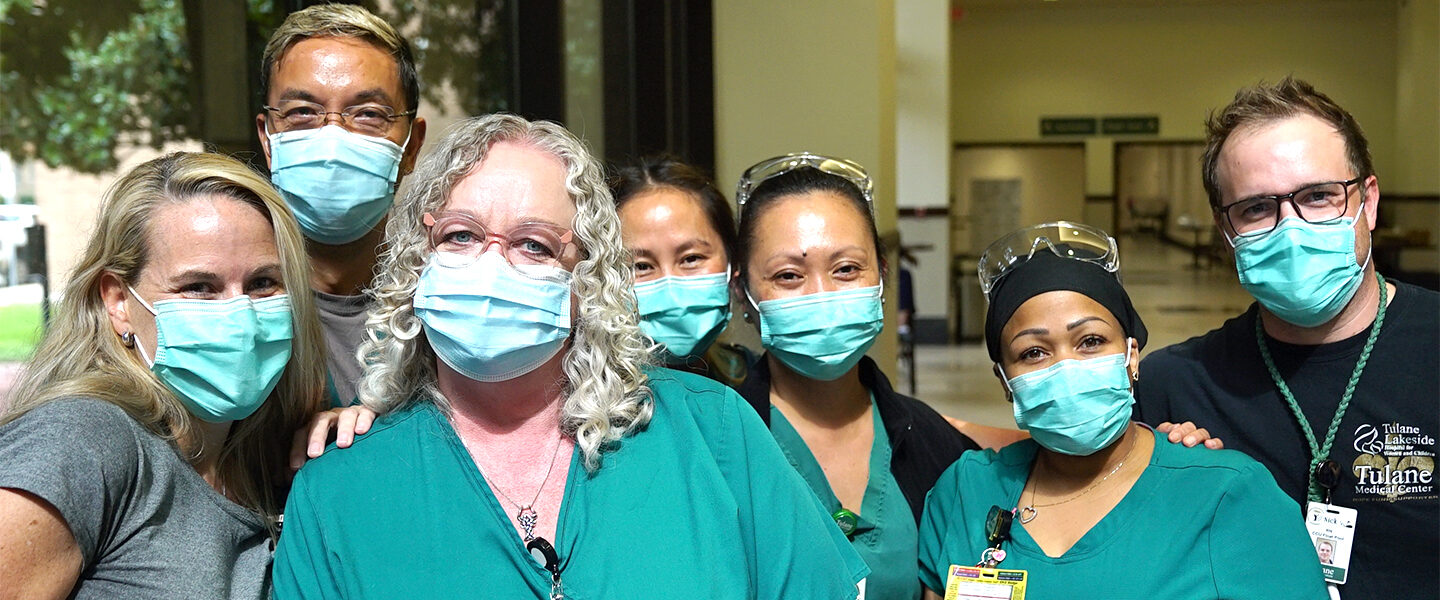
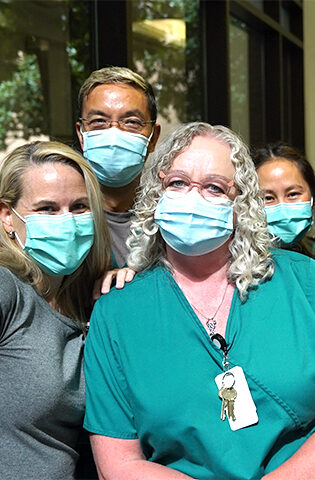
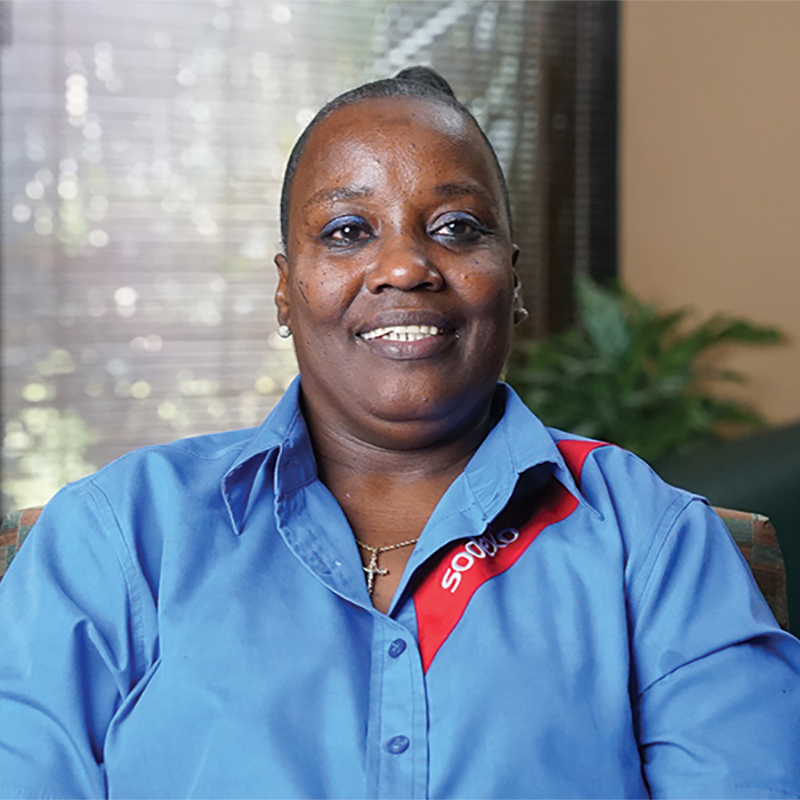
Tammy Jackson
Nutrition Services
Tulane Medical Center
New Orleans, La.
Hurricane Ida left its deadly and destructive mark from the Gulf Coast to New England in late August and early September, claiming more than 100 lives and causing damage in excess of $50 billion. Louisiana played an all too familiar role, absorbing a direct hit.
Despite power outages, flooding and limited access to supplies, all three HCA Healthcare hospitals in the New Orleans area — Tulane Medical Center, Tulane Lakeside Hospital and Lakeview Regional Medical Center — remained open. In Alexandria, Louisiana, HCA Healthcare affiliate Rapides Regional Medical Center also stayed open and received evacuees from the southern part of the state.
All of Jefferson Parish lost water pressure, including Tulane Lakeside Hospital where — as a precaution and to ensure continuity of care — our Enterprise Emergency Operations Center (EEOC) worked to safely transfer patients and colleagues to sister hospitals and other facilities in the region.
For some area residents, missing work, even during a hurricane, wasn’t an option when there were colleagues and patients to care for.
“I came in early on Saturday since I didn’t know what the weather would be like on Sunday [when Ida was to make landfall] ,” says Tammy Jackson, who works on the serving line in Nutrition Services at Tulane Medical Center. “Even when the lights went out, we kept serving”
Tammy — who was severely impacted by Hurricane Katrina in 2005 — can empathize with those who lost their homes. “My heart is so heavy for them,” she says. “I know what it’s like.” But, she adds, “Material stuff is material stuff; life is more important.
To provide care for other people, you have to be in a good place mentally. Being able to do what I do without having to worry about personal issues is phenomenal.— Nurse Deon Guidroz of Tulane Medical Center, whose Thibodaux, La., home sustained major storm damage.
A Transformative Experience
Mel Lagarde knows all too well Louisiana’s unfortunate history involving hurricanes.
“Many events in [the state] — notably Hurricane Katrina and my experiences with the Tulane Health System through that storm and recovery — have helped shape who I am as a healthcare leader and a person,” says Mel, president of the MidAmerica Division of HCA Healthcare.
“Hurricane Ida was every bit as defining an event for me. I had the privilege of working and living alongside our incredible teams [at area HCA Healthcare facilities], and the experience was nothing short of transformative.”
Mel says he saw caregivers and support staff working and living in our facilities for days on end to care for patients, often without knowing the condition of their own homes or the evacuation destination of their families. He saw colleagues and partners marshal incredible resources in mere hours to safely transfer patients — including babies — to sister facilities as the damage to the region’s infrastructure became clear.
Ida quickly gained notoriety as a threat, but she brought out the best in humanity, as disasters often do. People from throughout the division and HCA Healthcare took action, first contacting all colleagues to ensure their safety and determine any urgent needs they may have. Hotels were secured (and generators provided to run them) for colleagues without power, and in some cases for those who no longer had homes at all. While the hardest hit areas of Louisiana continue to clean up and slowly return to something approaching normal, the work is far from over. Hundreds of our colleagues still face challenges repairing their homes and putting their lives back together. We continue to care for many patients who will likely face more health issues caused by the storm and its devastation.
“But, as we have so many times, we will rise to this and any other challenge before us,” says Mel. “We have the support — of our organization and of each other — to make anything possible.”
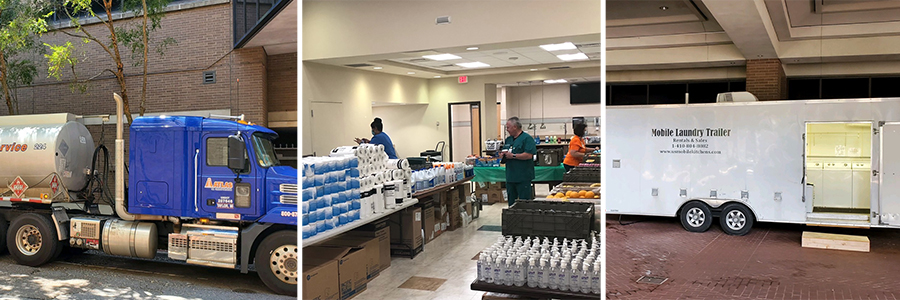
From left: Access to fuel, a colleague commissary, and laundry services were just a few of the resources made available to those in need in the wake of the hurricane.
Many events in [the state] — notably Hurricane Katrina and my experiences with the Tulane Health System through that storm and recovery — have helped shape who I am as a healthcare leader and a person.— Mel Lagarde, president of the MidAmerica Division of HCA Healthcare.
The Role of the EEOC
It’s times like these — whether it’s a natural disaster or other public safety emergency — that underscore the key role of HCA Healthcare’s Enterprise Emergency Operations Center (EEOC) in Nashville, where a team of nearly 200 was activated ahead of Hurricane Ida to monitor all areas of potential impact.
The safety of our colleagues, their families and our patients is always the chief concern. In response to Ida, HCA Healthcare coordinated sending resources such as fuel trucks, water tanker trucks, bottled water, temporary staffing and remediation teams to support our affected facilities and colleagues.
Since Hurricane Katrina, much has changed within technology and our ability to prepare, respond and sustain healthcare services impacted by devastation.
“I’m beyond proud of the commitment made by HCA Healthcare to ensure our ability to care for our patients, our staff and our communities,” says Mike Wargo, vice president and chief of enterprise emergency operations. “I’m especially thankful to my team, and all those who dedicate countless hours to making this commitment real.”
Jake Marshall, senior director of enterprise preparedness and emergency operations, is part of a team of both corporate colleagues and experts from across our nearly 200 hospitals and more than 2,000 sites of care that focuses on emergency preparedness and disaster response.
According to Jake, HCA Healthcare learns from every operation, whatever it may involve. “One hospital may have a good idea due to a unique circumstance,” he says . “That wealth of knowledge helps future responses.”
I’m beyond proud of the commitment made by HCA Healthcare to ensure our ability to care for our patients, our staff and our communities,— Mike Wargo, vice president and chief of enterprise emergency operations.
Giving Hope — by Giving
HCA Healthcare has thousands of colleagues working and living in the areas affected by Hurricane Ida, and many still need support and assistance. The HCA Healthcare Hope Fund, a 501(c)3 charity, provides emergency and longer-term recovery funding to our colleagues when major hardships arise due to a range of events including natural disasters. Anyone can make a tax-deductible donation to the Hope Fund; 100% of each gift goes directly to colleagues in need. To learn more and to donate online, visit hcahopefund.com/ donate/.
(As of Sept. 20, 2021, in the aftermath of Hurricane Ida, more than 1,000 HCA Healthcare colleagues had received emergency assistance funds totaling more than $950,000.)

